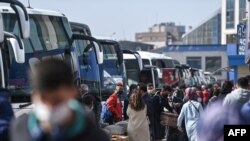Turkey on Thursday starts a strict new three-week lockdown as COVID-19 infections surge. Initially, Turkish authorities claimed success in curbing the pandemic, but the country could be paying the price for a premature easing of restrictions.
It is the country’s most severe lockdown since the onset of the COVID pandemic, with schools closing, alcohol sales banned, and only essential businesses like food shops being allowed to remain open.
For this Istanbul shoe shop, owner who asked to remain anonymous, there is fear for the future.
He said he does not want to call the 18-day shutdown unjust but he really sees it as “the end.” He said Turks are in a state of complete hopelessness. “We are finished,” he said, adding one can endure this “only up to a point.”
Compounding the economic pain for Turks is that the government has not announced any financial assistance for those suffering losses.
Already Turkish media report unofficial levels of unemployment exceed 25%, while aid groups report a surge in poverty and warn that large sections of society are struggling to find enough to eat.
Intercity travel will only be permitted with special permission. Already there was chaos, as those in other parts of the country scrambled to return home this week before the restrictions came into force late Thursday.
The draconian measures are in response to an enormous surge in COVID infections. Turkey reported 40,000 on Wednesday – the highest daily count in Europe.
Sebnem Korur Fincanci, chair of the Turkish Medical Association, says Turkey’s hospitals are struggling.
“The hospital beds are already full, particularly the intensive care units. They have to open new COVID clinics. And, also, the health professionals will burn out. They [are] already burned out and with this new situation this will overburden the health system," Fincanci said.
The surge in infections comes after the government eased restrictions in March.
Turkish President Recep Tayyip Erdogan even toured the country, holding party rallies in packed indoor stadiums - actions that drew strong condemnation from opposition parties.
Erdogan announced the new restrictions Monday, warning Turkey could pay a heavy price if they fail.
At a time when Europe is entering a phase of reopening, Erdogan said, Turkey must rapidly reduce the number of cases to fewer than 5,000 a day and is not, he said, to be left behind. Otherwise, the Erdogan said, Turkey will face consequences in every field, from tourism to trade and education.
Tourism is vital for the Turkish economy, providing an essential source of foreign income and providing millions of urgently needed jobs.
With hospitals filling up and the peak tourism period fast approaching, analysts see the latest lockdown as a sign that Ankara is aware time is running out.




